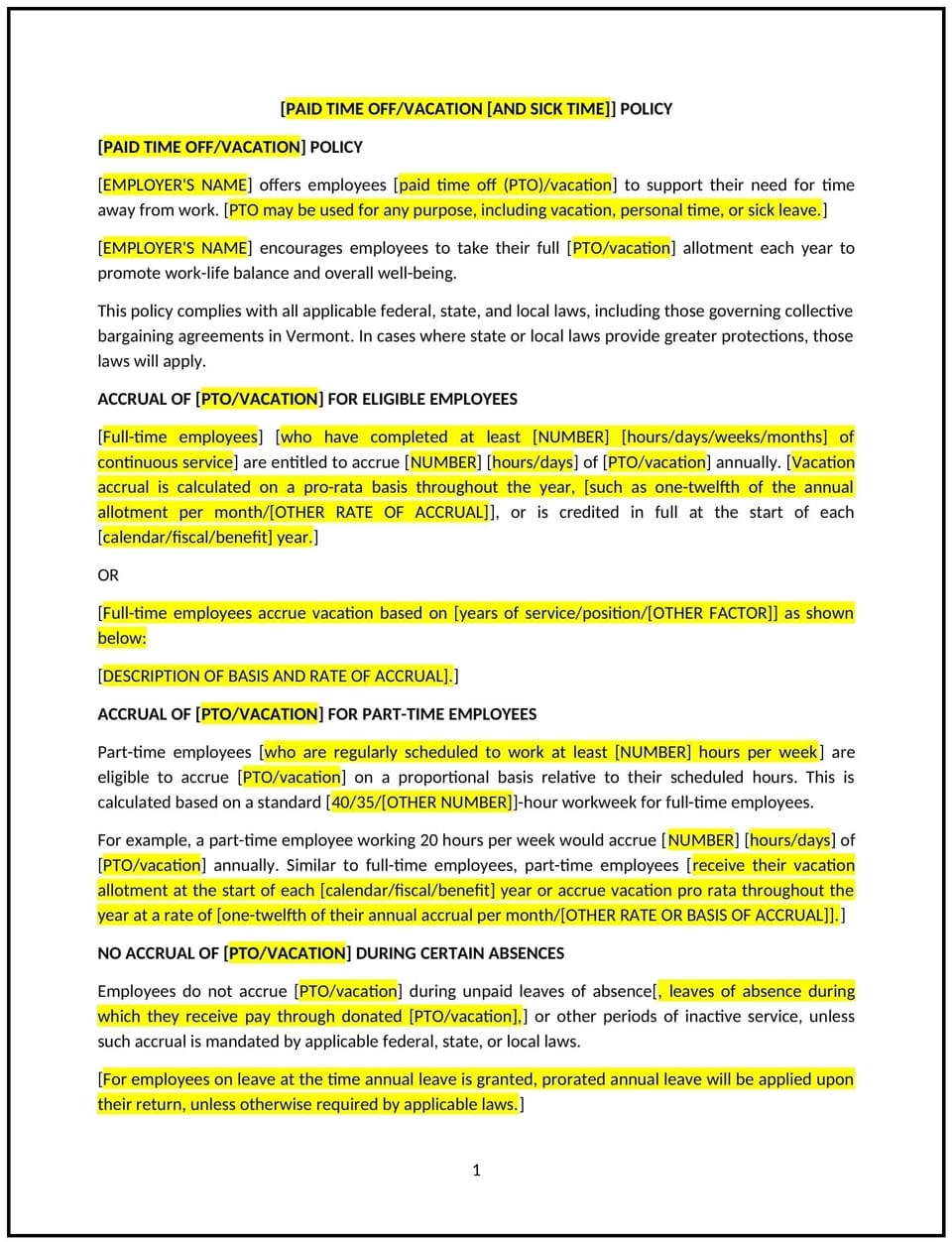Vacation policy (Vermont): Free template

Vacation policy (Vermont)
This vacation policy is designed to help Vermont businesses provide employees with clear guidelines for taking time off. It outlines vacation accrual, usage, and approval processes to ensure transparency and alignment with Vermont labor laws.
By adopting this policy, businesses can support work-life balance, promote employee satisfaction, and maintain operational efficiency.
How to use this vacation policy (Vermont)
- Define vacation accrual: Specify how vacation time is accrued, such as based on hours worked, years of service, or other criteria.
- Set usage guidelines: Outline how and when employees can use accrued vacation time, including any blackout periods or advanced notice requirements.
- Include carryover rules: Specify whether unused vacation time can be carried over to the next year and, if so, any limits on the amount.
- Address payout requirements: Clarify whether unused vacation time is paid out upon termination, adhering to Vermont labor laws.
- Establish approval procedures: Provide steps for requesting vacation, including submission deadlines and manager approval requirements.
- Monitor scheduling: Encourage managers to balance employee vacation requests with business needs to minimize disruptions.
- Track compliance: Regularly review vacation policies and practices to ensure alignment with Vermont laws and company objectives.
Benefits of using this vacation policy (Vermont)
This policy provides several benefits for Vermont businesses:
- Promotes work-life balance: Encourages employees to take time off for rest and rejuvenation.
- Enhances transparency: Provides clear guidelines for vacation accrual and usage.
- Reduces disputes: Minimizes misunderstandings about vacation eligibility and approval processes.
- Supports compliance: Aligns with Vermont labor laws governing vacation time and payouts.
- Maintains efficiency: Helps businesses manage staffing and workload during employee absences.
Tips for using this vacation policy (Vermont)
- Communicate the policy: Share the policy with employees during onboarding and include it in the employee handbook or internal resources.
- Plan in advance: Encourage employees to submit vacation requests early to allow for proper scheduling.
- Use tracking systems: Implement tools to monitor vacation accrual, usage, and balances.
- Foster fairness: Ensure vacation approvals are handled equitably across all employees.
- Update regularly: Revise the policy to reflect changes in Vermont labor laws or company practices.
Q: How is vacation time accrued under this policy?
A: Vacation time may be accrued based on factors such as hours worked, years of service, or company-specific criteria outlined in the policy.
Q: Can unused vacation time be carried over to the next year?
A: Carryover rules depend on company policy, which may allow unused vacation to roll over, subject to limits, or require use-it-or-lose-it practices in compliance with Vermont laws.
Q: How should employees request vacation time?
A: Employees should submit vacation requests to their manager, following the advance notice requirements specified in the policy.
Q: What happens to unused vacation time upon termination?
A: Vermont businesses must follow state laws regarding the payout of unused vacation time, which may require payment depending on the company’s policy and employment agreements.
Q: Are there blackout periods for taking vacation?
A: Businesses may designate certain times of the year as blackout periods when vacation requests cannot be accommodated due to operational needs.
Q: How should businesses handle overlapping vacation requests?
A: Managers should prioritize requests based on factors such as the order of submission, operational impact, and fairness among employees.
Q: How often should this policy be reviewed?
A: This policy should be reviewed annually or whenever significant changes occur in Vermont labor laws or workplace practices.
Q: Does this policy apply to part-time employees?
A: Businesses should specify whether part-time employees are eligible for vacation accrual, typically prorated based on their hours worked.
This article contains general legal information and does not contain legal advice. Cobrief is not a law firm or a substitute for an attorney or law firm. The law is complex and changes often. For legal advice, please ask a lawyer.


